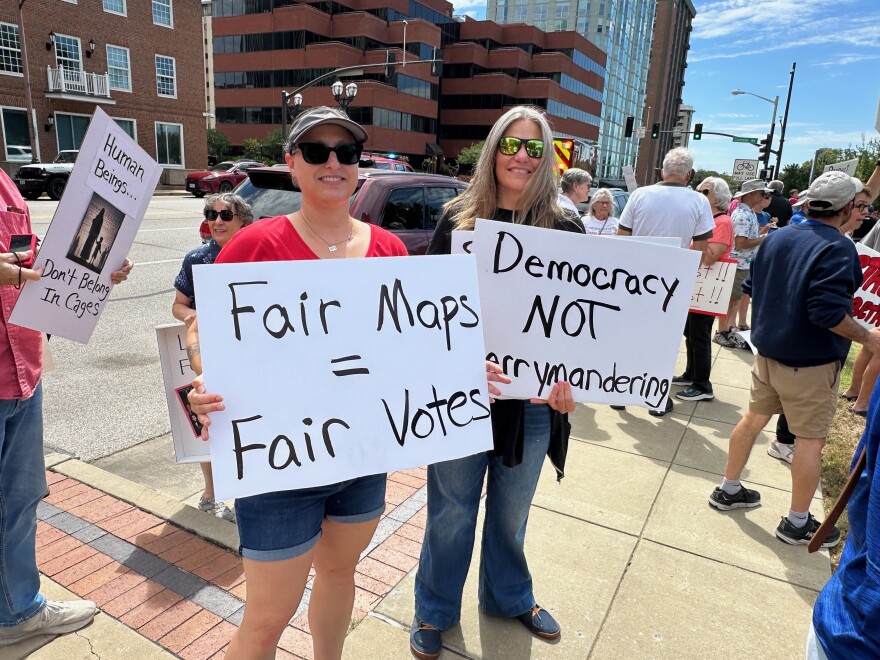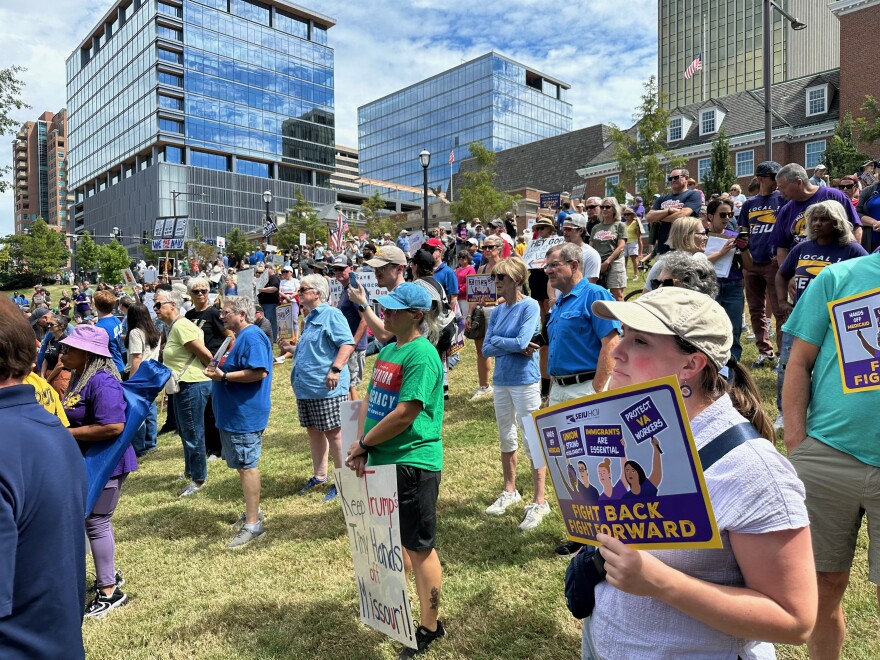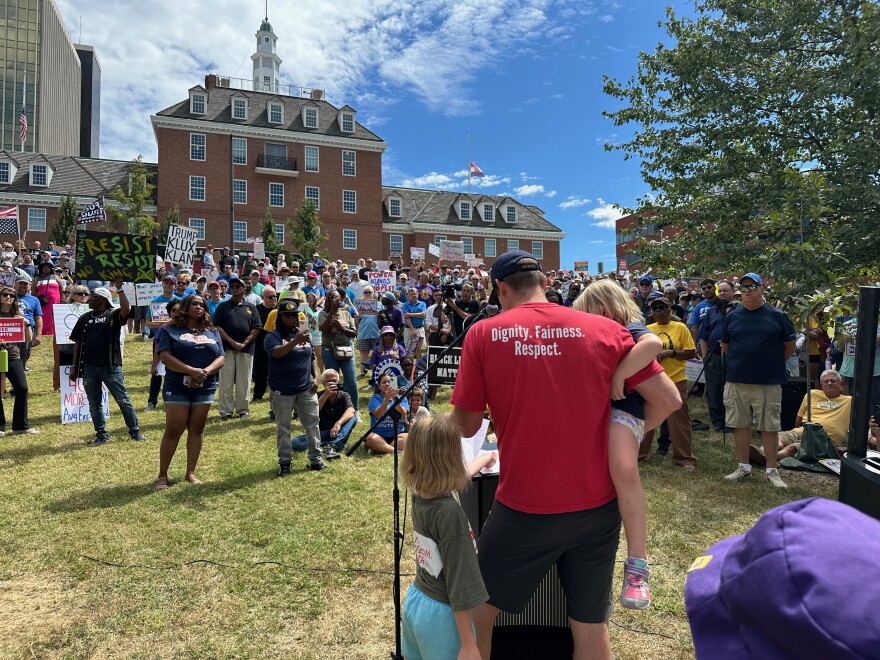After Don Looney stepped to the microphone on Monday at Shaw Park in Clayton, the longtime United Auto Workers member decided to go “off script.”
Looney was speaking to hundreds of people enraged about Gov. Mike Kehoe’s decision to bring lawmakers back into session this week to redraw Missouri's congressional districts and to severely hamper the state’s initiative petition process. He praised the rallygoers for expressing disdain at the move but added that more than anger is required.
“Today ain't enough,” Looney said. “Coming out here and standing on this side corner, holding up your signs, and letting people honk? Y'all, this ain't a party. This is a fight for our lives.”
Kehoe is asking lawmakers to convert Democratic Congressman Emanuel Cleaver’s Kansas City-based 5th District into a GOP-leaning seat. He’s also asking legislators to place a proposal before voters that would require a constitutional amendment to pass statewide and in every congressional district to be enacted.
Kehoe said on Friday that "Missouri’s conservative, common-sense values should be truly represented at all levels of government." Other Missouri Republicans say that the legislature should engage in mid-decade redistricting to prevent the Democrats from winning a majority in the U.S. House next year.
And in some respects, Looney is illustrating a conundrum for special session critics.
Because Democrats are so outnumbered in the Missouri General Assembly, the only way for either special session priority to falter is if enough Republicans defect. And that doesn’t seem likely, given that President Donald Trump is pressuring Missouri Republicans to pass the map “as is” – and that not acting on that demand could imperil the futures of GOP state legislatures.
State Sen. Doug Beck, D-St. Louis County, said part of the problem is that Missouri continues to back progressive ballot initiatives and elect lawmakers who oppose those policies. He pointed to 2018, when Missourians overwhelmingly repealed "right to work" in August – but then elected state lawmakers in November who opposed a requirement for workers to pay union dues as a condition of employment.
“This is our problem. We have to tie issues to people,” Beck said. “They think they're going to get elected because they've never had any ramifications for trying to take away the will of the people.”

While noting that there were other points in the last decade that seemed like turning points against the GOP dominance in the state, some rallygoers contended that the redistricting and special session plan is the turning point to pull Missouri away from Republicans' grip.
Webster Groves resident Leslie Hinyard said the fact that Trump and his GOP state legislative allies have to redraw districts in the middle of the decade shows that they’re scared about the 2026 midterm elections.
Trump successfully pushed Texas to redraw its congressional map and is also pressuring other GOP-run states like Florida and Indiana to follow suit. Democratic-leaning states like Illinois and Maryland may overhaul their maps, while California's voters will consider a plan to help Democrats win more seats there.
“Our representatives should actually represent the will of the population and not overrule it, and not draw lines to cheat in order to win,” Hinyard said. “Clearly, if you have to do that, it's because the people would like something else and someone else in power.”
And St. Louis County resident Arianna Kimbrough contends that the special session is another example of Republican overreach. She said there’s already been public backlash over how the GOP-controlled legislature gutted a voter-approved paid sick leave initiative after the measure went into effect.
“They're also now trying to take away our political freedom and our ability to be seen and represented,” Kimbrough said.

Unintended consequences
Missouri Republicans had an opportunity to draw Cleaver into a GOP-leaning district in 2022 but declined. They contended that the move was too risky, since pulling off such a move would require placing heavily Democratic parts of Kansas City into Reps. Mark Alford and Sam Graves’ districts.
The map Kehoe released on Friday would still feature seven GOP-leaning districts. But some demonstrators agreed that it could backfire if the national environment turns toward the Democrats next year. That’s highly possible given that the president’s party in power often does poorly in midterm elections.
“By putting so many liberals together in a very small district together in St Louis, and then breaking us up across Kansas City, there is an absolute possibility that we could go from having just two Democratic representatives to three or four, and that would be ideal,” said Brentwood resident Laura Gordon, who is part of Indivisible’s St. Louis chapter.
Gordon is referring to how the map Kehoe released clusters the heavily Democratic city of St. Louis and north St. Louis County into Congressman Wesley Bell’s 1st District. Congresswoman Ann Wagner’s nearby 2nd District remains Republican-leaning under the revised map, but not overwhelming enough for the Ballwin Republican to avoid a strong challenge during a bad year for the GOP.
State Rep. Mark Boyko said many of his GOP colleagues know the new map could backfire – which is why it wasn't enacted in 2022.
But the Kirkwood Democrat added he doesn’t expect Republicans to ignore Trump’s demands, even if it means taking a contradictory position from just a few years ago.
“Anyone who stands up to Trump gets destroyed by his people,” Boyko said. “So I understand the pressure that Kehoe was under to reverse his preference from three years ago. I understand the same pressure that my colleagues were under to reverse their votes that they took three years ago.... I get those pressures. But it does take courage to represent the people in Missouri when you have the D.C. Beltway breathing down your neck.”

Leverage after the fact?
While state legislative Democrats will likely not have the power to stop their Republican counterparts from approving aspects of Kehoe’s special session agenda, they do have some options once lawmakers leave Jefferson City.
Democrats will almost certainly challenge the map in court. They contend that the Missouri Constitution doesn’t authorize mid-decade redistricting and added that there is no way to prove they meet equal population standards since they’re created with outdated census data.
Others, including Boyko, said that passing the new map would likely spur interest in turning over the congressional redistricting process to a commission. Such a move would require a statewide vote. And, as of now, constitutional amendments only require a majority to pass.
“Frankly, we already have a map that's partisan. Now it's going to be hyperpartisan if all of this passes. So yes, they're scared of that. They're scared of the people. Because they've consistently, over the last several years, voted down things that are very popular with Missourians.”
Republicans will have to use the legislative maneuver known as the “previous question” motion to pass the initiative petition and redistricting measure through the Missouri Senate. Democrats could then gum up the works during the 2026 legislative session, which could make it difficult, if not impossible, for the GOP to do very much.
While Beck didn’t say exactly how Democrats would retaliate, he did add the Republicans are risking doing away with a Missouri Senate known for its methodical posture toward legislation.
“It's all about relationships. You can't have relationships without honesty,” Beck said. “And we don't have that in the Senate right now. People will say: ‘Well, why don't you try to make a deal with them.’ Like, who do I make a deal with? Because there's nobody I trust. There's nobody to trust. They lie to us.”
Maplewood resident Vinita Ledesma said ultimately the biggest losers in the upcoming special session will be voters – including those who may face immense confusion on who represents them in Washington and how the initiative petition process will work going forward.
“You have to be a knowledgeable voter, and that's kind of hard when everybody's so busy and you're inundated with so much information and misinformation,” Ledesma said. “Sometimes you don't even look at what's happening in Missouri. And that's why when Missouri came up on the national news, it was like: ‘Oh, it’s happening here now.’”








